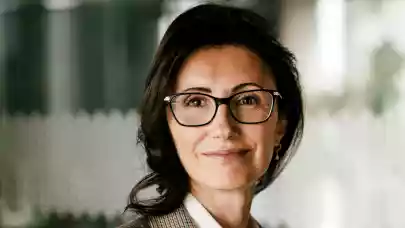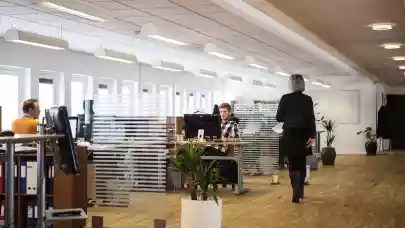
Aurelia Luca, Executive Vice President Operations Hungary and Romania at Skanska spoke to Property Forum about the flexibility of office space amid the popularity of hybrid working and the ESG criteria that will dominate office leasing and investment activity in the coming years.
This interview was first published in Property Forum’s annual listing of "The 50 most influential people on Romania’s real estate market”.
What are Skanska’s plans for the Romanian market this year in terms of development and new investments?
We plan to start construction on the fourth phase of Campus 6, Campus 6.4, but we continue to monitor the effects of the war in Ukraine and the increased volatility of the building materials market. Once completed, the complex will have a total area of 81,000 sqm in four Class A buildings and will provide a total of approximately 6,000 sqm of green space for both tenants and the local community.
We are also progressing on the Equilibrium 2 office building, which we expect to be completed in the first quarter of 2023. We plan to sell the entire complex after the completion of the lease process, for which discussions are currently at various stages.
The 12-storey building will have a leasable area of approximately 19,900 sqm and 229 above and underground parking spaces. On completion, the entire complex of two buildings will offer 40,800 sqm of leasable area and 3,500 sqm of green space for relaxation.
In addition, in 2022, we continue to analyse the market to identify new opportunities.

Aurelia Luca
EVP Operations Hungary and Romania
Skanska
How do you approach the return to office buildings of employees and how have the projects transformed during the pandemic period?
The pandemic has reshaped employees’ expectations and attitudes towards office work, as our recent research shows. New offices need to make it easier to socialise, share experiences and find work-life balance, after a period that blurred the boundaries between the two. We expect employees to increasingly return to the office this year, precisely because of the need to restore the balance between office and home life.
What is certain is that the office will continue to be an important part of working life. Employees will not give up working from the office, but rather want the flexibility to work both from the office and from home or different locations.
Are Skanska’s office designs ready for the hybrid working system that seems to be increasingly accepted by large companies?
Skanska’s buildings are certainly ready for hybrid working, a model that, according to our surveys, most employees consider to be the ideal working model. The results show that for 51% of the employees surveyed, the ideal working pattern involves at least 3-4 days a week worked from the office. This trend is visible in all CEE countries.
Together with our internal and external consultants, we have tried to redefine the future of the workplace and adapt the concept to meet the new needs of employees and employers. This gave birth to the Care for Life Office Concept, a concept developed by Skanska, aimed at ensuring the safety of employees when they return to the office.
How do you manage the rising costs of building materials for new projects in Romania and CEE?
The volatility of the building materials market, initially generated by the pandemic and continuing due to the recent events in Ukraine, is a worrying factor not only for Skanska, but for the whole real estate market, internationally. The immediate impact for the entire construction industry has been delays in the delivery of materials and site equipment, in addition to price increases.
The main difficulties we have encountered are related to finalising budgets to meet the expectations of all parties involved – from clients, general contractors, specialist sub-contractors and suppliers. Unprecedented price increases for construction equipment and materials from 2021 onwards, caused by increased demand and shortages of raw materials, have made it impossible to guarantee offers for longer periods of time. With all this in mind, we have pre-ordered materials for our projects, controlling this risk and ensuring that we operate according to the established schedules.
What stage are you at with your plan to achieve carbon neutral operations?
Our plan to achieve carbon neutrality in our own operations has achieved results that have exceeded initial expectations. Today, at group level, we have achieved emission reductions of more than 46% in current projects, which has motivated us to update our target with a new and even more ambitious target. Thus, we aim to reduce carbon emissions not by 50% but by 70% by 2035 and to move towards zero-net in our own operations and supply chain by 2045. The Equilibrium 1 project is currently running 100% on renewable energy.
A further step in this endeavour is strategic partnerships with other like-minded players in the market. We are very proud that Skanska is part of the Financial Times and Statista “Climate Leaders” list which ranks 4,000 companies according to their carbon emissions. Only 10% of them can be included in this selection. Also, we are collaborating with the Romania Green Building Council, with whom we are pursuing the development of Net Zero Buildings certification.
How important is the topic of building sustainability for companies looking to rent space or for investors looking to buy a project?
Both employees and investors attach increasing importance to environmental, social and governance (ESG) criteria, which will greatly determine the shape of the market in the future, as well as the valuation of properties. These will greatly influence the purchase decision, and tenants and investors will expect these principles to be implemented to the highest standards.
Green, future-proof buildings, such as Skanska’s buildings, will certainly become the new standard, accelerating the transition to a carbon-neutral society.
Do you work with startups specialising in real estate and how can entrepreneurs help a developer with international exposure?
Together with the Bright Spaces startup we have developed the Skanska Spaces digital platform, an innovative solution that is revolutionising the real estate market. The 3D platform offers the opportunity to interact with the space through virtual reality and will allow for customised space planning to find the ideal design and fit out.
The new context, where digitisation is no longer just an option but a must-have, will push developers to look for innovative solutions and entrepreneurs to come up with the most novel and efficient approaches.
What are the prospects for the Romanian commercial real estate market in terms of attracting investment this year?
Alongside the sustainability agenda and the integration of ESG principles, investors will increasingly look at core products when it comes to acquisitions.
In a context of rising inflation like the one we are going through at present, the real estate market will attract investment funds looking to protect value for money over time. Investors will therefore look for assets whose value is not eroded by inflation, and commercial property falls into this category.



